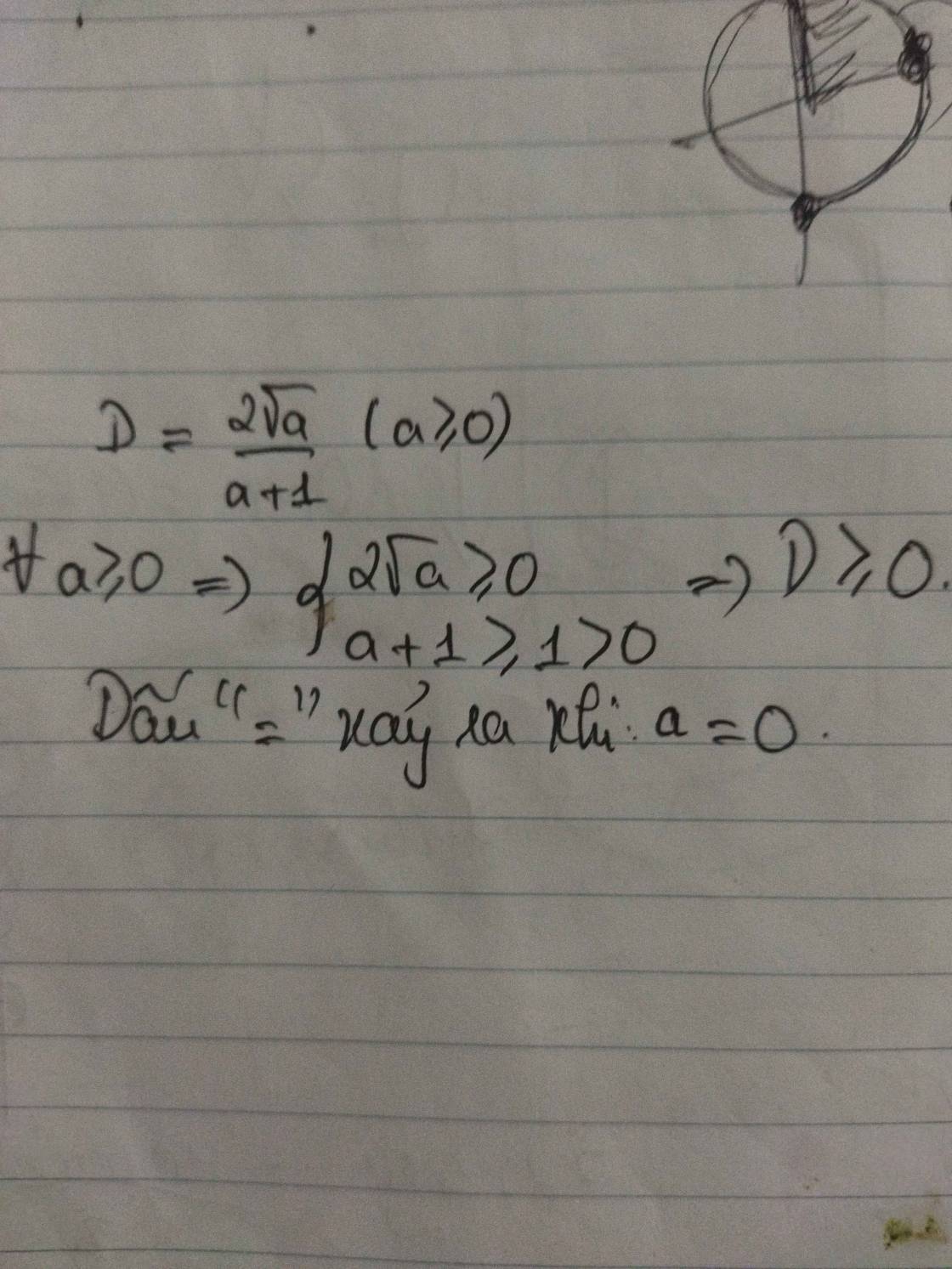
Hãy nhập câu hỏi của bạn vào đây, nếu là tài khoản VIP, bạn sẽ được ưu tiên trả lời.


1 quy đồng lên ra được
2 \(A=\dfrac{1}{x-2\sqrt{x-5}+3}\le\dfrac{1}{5-2.0+3}=\dfrac{1}{8}\)
dấu"=" xảy ra<=>x=5
ở câu 1 mình làm cách quy đồng rồi nhưng nó ko ra, bạn có cách khác ko?

đkxđ: \(z\ge1;x\ge2;y\ge3\)
Đặt \(a=\sqrt{z-1}\ge0;b=\sqrt{x-2}\ge0;c=\sqrt{y-3}\ge0\)
\(\Rightarrow z=a^2+1;x=b^2+2;y=c^2+3\)
\(\Rightarrow A=\dfrac{a}{a^2+1}+\dfrac{b}{b^2+2}+\dfrac{c}{c^2+3}\)
Do các biến \(a,b,c\) độc lập nhau nên ta xét từng phân thức một.
Đặt \(f\left(a\right)=\dfrac{a}{a^2+1}\) \(\Rightarrow f\left(a\right).a^2-a+f\left(a\right)=0\) (*)
Nếu \(f\left(a\right)=0\) thì \(a=0\), rõ ràng đây không phải là GTLN cần tìm.
Xét \(f\left(a\right)\ne0\)
Để pt (*) có nghiệm thì \(\Delta=\left(-1\right)^2-4\left[f\left(a\right)\right]^2\ge0\)
\(\Leftrightarrow\left(1+2f\left(a\right)\right)\left(1-2f\left(a\right)\right)\ge0\)
\(\Leftrightarrow-\dfrac{1}{2}\le f\left(a\right)\le\dfrac{1}{2}\)
\(f\left(a\right)=\dfrac{1}{2}\Leftrightarrow\dfrac{a}{a^2+1}=\dfrac{1}{2}\Leftrightarrow a^2+1=2a\Leftrightarrow a=1\) (nhận)
Vậy \(max_{f\left(a\right)}=\dfrac{1}{2}\).
Tiếp đến, gọi \(g\left(b\right)=\dfrac{b}{b^2+2}\) \(\Rightarrow g\left(b\right).b^2-b+2g\left(b\right)=0\) (**)
Tương tự nếu \(b=0\) thì vô lí. Xét \(b\ne0\). Khi đó để (**) có nghiệm thì \(\Delta=\left(-1\right)^2-8\left[g\left(b\right)\right]^2\ge0\)
\(\Leftrightarrow\left(1-2\sqrt{2}g\left(b\right)\right)\left(1+2\sqrt{2}g\left(b\right)\right)\ge0\)
\(\Leftrightarrow-\dfrac{1}{2\sqrt{2}}\le g\left(b\right)\le\dfrac{1}{2\sqrt{2}}\)
\(g\left(b\right)=\dfrac{1}{2\sqrt{2}}\Leftrightarrow\dfrac{b}{b^2+2}=\dfrac{1}{2\sqrt{2}}\Leftrightarrow b^2+2=2\sqrt{2}b\Leftrightarrow b=\sqrt{2}\) (nhận)
Vậy \(max_{g\left(b\right)}=\dfrac{1}{2\sqrt{2}}\)
Làm tương tự với \(h\left(c\right)=\dfrac{c}{c^2+3}\), ta được \(max_{h\left(c\right)}=\dfrac{1}{2\sqrt{3}}\), xảy ra khi \(c=\sqrt{3}\)
Vậy GTLN của A là \(\dfrac{1}{2}+\dfrac{1}{2\sqrt{2}}+\dfrac{1}{2\sqrt{3}}=\dfrac{6+3\sqrt{2}+2\sqrt{3}}{12}\), xảy ra khi \(\left(a,b,c\right)=\left(1,\sqrt{2},\sqrt{3}\right)\) hay \(\left(x,y,z\right)=\left(2,4,6\right)\).

Theo Cauchy:
\(3\sqrt{2a-1}=3\sqrt{1\left(2a-1\right)}\le\dfrac{3\left(1+2a-1\right)}{2}=3a\)
\(a\sqrt{5-4a^2}\le\dfrac{a^2+5-4a^2}{2}=\dfrac{5-3a^2}{2}\)
\(A\le3a+\dfrac{5-3a^2}{2}=\dfrac{5-3a^2+6a}{2}=\dfrac{-3\left(a-1\right)^2}{2}+4\le4\)
Vậy \(A_{max}=4\Leftrightarrow x=1\)
bạn có cách nào đoán điểm rơi hay thế ạ , phải thử thôi hay có cách gì khác nữa không v

a: \(Q=\left(\dfrac{1}{\sqrt{a}+1}+\dfrac{1}{a+\sqrt{a}}\right):\dfrac{\sqrt{a}-1}{a+2\sqrt{a}+1}\)
\(=\dfrac{\sqrt{a}+1}{\sqrt{a}\left(\sqrt{a}+1\right)}\cdot\dfrac{\left(\sqrt{a}+1\right)^2}{\sqrt{a}-1}\)
\(=\dfrac{a+2\sqrt{a}+1}{a-\sqrt{a}}\)

a: \(A=\dfrac{2\sqrt{x}+6+\sqrt{x}-3}{x-9}\cdot\dfrac{\sqrt{x}-3}{\sqrt{x}+1}\)
\(=\dfrac{3\left(\sqrt{x}+1\right)}{x-9}\cdot\dfrac{\sqrt{x}-3}{\sqrt{x}+1}=\dfrac{3}{\sqrt{x}+3}\)
b: \(\sqrt{x}+3>=3\)
=>A<=1
Dấu = xảy ra khi x=0
c: \(P=A:\left(B-1\right)=\dfrac{3}{\sqrt{x}+3}:\dfrac{2\sqrt{x}+1-\sqrt{x}-3}{\sqrt{x}+3}=\dfrac{3}{\sqrt{x}-2}\)
Để P nguyên thì căn x-2\(\in\left\{1;-1;3;-3\right\}\)
=>\(x\in\left\{1;25\right\}\)

Ta có :A=\(\dfrac{\sqrt{x}+2}{\sqrt{x}+1}\) -\(\dfrac{2\sqrt{x}-2}{\sqrt{x}-1}\)
=\(\dfrac{\sqrt{x}+2}{\sqrt{x}+1}\)-2
=\(\dfrac{-\sqrt{x}}{\sqrt{x}+1}\)
thay vào A=\(\dfrac{-2}{3}\)
b)
A=-1+\(\dfrac{1}{\sqrt{x}+1}\) \(\ge\) -1+\(\dfrac{1}{1}\)=1(vì \(\sqrt{x}\)\(\ge\) 0)
Dấu bằng xẩy ra\(\Leftrightarrow\) x=0
chỗ đó cho thêm x-1 nha
đấu >= thay thành <= rùi nhân thêm x-1>=-1 nữa là lớn nhất bằng 0

Min D = 0 tại a =0
DK: a≥0
Với dk ta có \(a+1\ge2\sqrt{a}\Leftrightarrow\dfrac{2\sqrt{a}}{a+1}\le1\)
Vậy GTLN của D là 1 khi a=1(Bất đẳng thức Cô si)